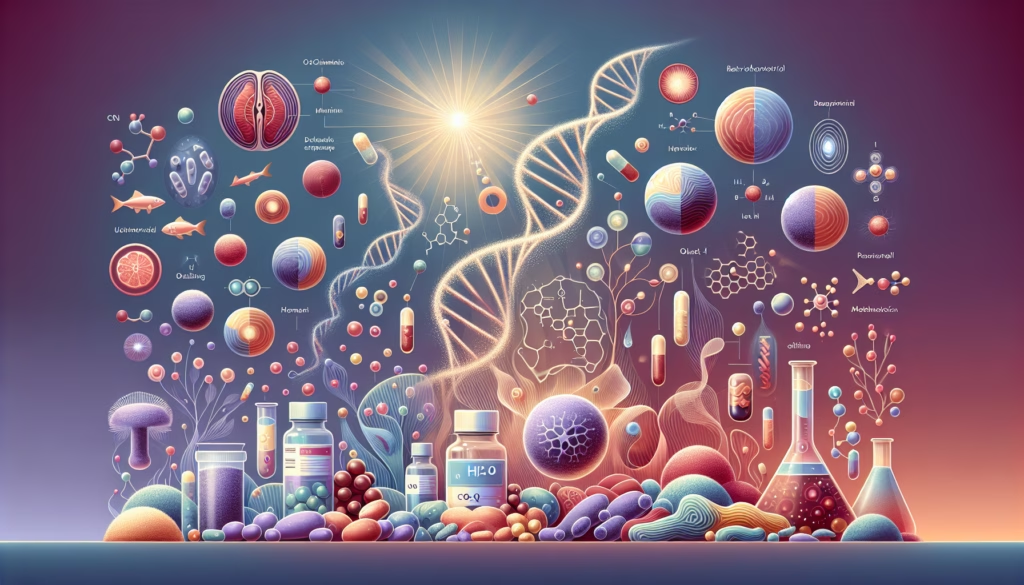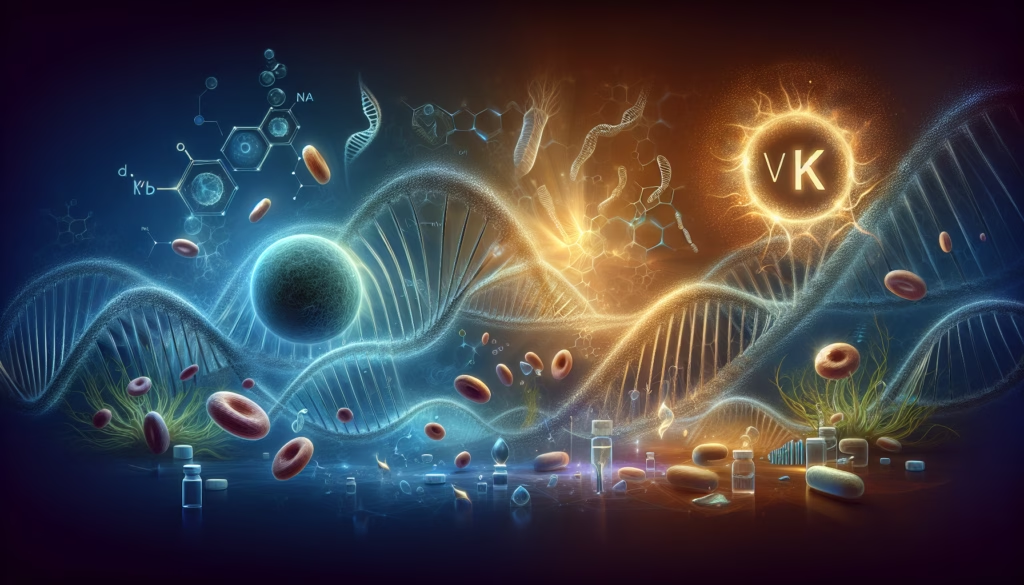
Beta Glucan
Discover the science-backed potential of beta glucan as an adjunct in cancer therapy. This post delves into the latest research
Click 
Vitamin D3, a fat-soluble vitamin crucial for bone health and immune function, has garnered significant attention for its potential anti-cancer effects. Research suggests that vitamin D3 may play a role in preventing and treating various types of cancer by modulating cell growth, apoptosis, angiogenesis, and immune responses.
Cell Cycle Regulation and Apoptosis: Vitamin D3 helps regulate the cell cycle, preventing excessive cell division, and promotes apoptosis, or programmed cell death, in cancer cells89. This process is crucial for eliminating damaged cells that could otherwise become malignant.
Angiogenesis Inhibition: Vitamin D3 can inhibit angiogenesis, the formation of new blood vessels that supply nutrients to tumours, thereby limiting tumour growth and metastasis28.
Immune System Modulation: Vitamin D3 enhances immune responses, which can help the body recognize and attack cancer cells more effectively59.
Signalling Pathways: Vitamin D3 influences several signalling pathways, including the PI3K-Akt and HIF-1 pathways, which are involved in cell proliferation and survival4.
Colorectal Cancer (CRC): Studies indicate that vitamin D3 may reduce the risk of CRC by regulating cell proliferation and apoptosis through pathways like PI3K-Akt4. Clinical trials have shown promising results in delaying disease progression when vitamin D3 is combined with chemotherapy for metastatic CRC3.
Breast Cancer: Higher vitamin D levels have been associated with reduced breast cancer risk and improved survival rates510.
Prostate Cancer: While the evidence is mixed, maintaining adequate vitamin D levels may help slow prostate cancer progression due to its anti-inflammatory properties5.
Randomized Controlled Trials: Large trials like VITAL and ViDA have not shown a significant reduction in overall cancer incidence with vitamin D supplementation2. However, smaller studies and meta-analyses suggest potential benefits in specific contexts, such as reducing cancer mortality with daily dosing68.
Observational Studies: Many observational studies suggest a link between higher vitamin D levels and lower cancer risk, particularly for colon, breast, prostate, and ovarian cancers1011.
While vitamin D3 shows promise as an adjunctive therapy in cancer treatment, further research is needed to fully understand its potential benefits and optimal dosing strategies. Ongoing studies are exploring vitamin D analogs and combinations with other treatments to enhance efficacy and minimize side effects2.
In conclusion, vitamin D3’s role in cancer prevention and treatment is complex and multifaceted. As research continues to uncover its mechanisms and potential applications, maintaining optimal vitamin D3 levels may become an important aspect of comprehensive cancer care strategies.
Clinical studies suggest that a daily dosage of Vitamin D3 ranging from 800 IU (20 µg) to 2000 IU (50 µg) is effective for general health. Higher dosages may be necessary for specific clinical conditions and should be assessed by clinical research.
Breast Cancer, Colorectal Cancer, Prostate Cancer
Vitamin D3 is generally considered safe when taken at recommended doses. However, excessive intake can lead to vitamin D toxicity, which is associated with several adverse effects.
Digestive Issues: Nausea, vomiting, constipation, and stomach pain are common due to hypercalcemia, a condition where calcium levels in the blood become too high126.
Musculoskeletal Symptoms: Muscle weakness and bone pain can occur due to excessive calcium deposition in bones26.
Neurological Symptoms: Fatigue, dizziness, confusion, and irritability are reported26.
Cardiovascular Issues: High blood pressure and irregular heartbeats can occur13.
Kidney Problems: Kidney stones and kidney failure are potential risks due to hypercalcemia26.
Higher doses of vitamin D3 are sometimes used to treat deficiencies, but they should be taken under medical supervision. The Tolerable Upper Intake Level (UL) is set at 4,000 IU per day, and exceeding this can increase the risk of adverse effects78. Some studies suggest that even doses below the UL can be harmful over time, especially if taken consistently8.
Hypercalcemia: The primary risk of high-dose vitamin D3 is hypercalcemia, which can lead to severe health issues like kidney failure, heart problems, and bone abnormalities136.
Long-Term Effects: Chronic high-dose intake can result in prolonged symptoms due to vitamin D’s long half-life, requiring several weeks for symptoms to resolve after cessation4.
While vitamin D3 is essential for health, its supplementation should be approached cautiously. It is crucial to monitor vitamin D levels and adjust dosages accordingly to avoid toxicity. Healthcare professionals should be consulted before starting high-dose vitamin D3 supplements57.
Vitamin D3 has been tested in combination with other therapies for cancer treatment and prevention.
Here are some examples:
Vitamin D3 with Chemotherapy and Bevacizumab for Colorectal Cancer:
The SOLARIS trial, a phase III clinical trial, investigated the addition of high-dose vitamin D3 to standard chemotherapy (including drugs like fluorouracil, oxaliplatin, and irinotecan) and bevacizumab for patients with untreated metastatic colorectal cancer. While high-dose vitamin D3 did not significantly delay cancer progression overall, there was a potential benefit observed in patients with left-sided tumors, which warrants further investigation13.
Vitamin D3, Omega-3 Fatty Acids, and Exercise for Cancer Prevention:
A study published in Frontiers in Aging found that combining vitamin D3, omega-3 fatty acids, and a simple home exercise program (SHEP) reduced the risk of invasive cancer by 61% in adults aged 70 and older. Each component had a small individual benefit, but the combination was significantly more effective24.
Vitamin D3 with Other Cancer Treatments:
Vitamin D analogs, such as calcitriol, have been studied in combination with chemotherapy, radiation therapy, and other treatments. These combinations aim to enhance antitumor activity by promoting apoptosis and inhibiting cell growth. For example, calcitriol has been used synergistically with radiation to enhance apoptosis in prostate cancer cells7.
Vitamin D3 for Musculoskeletal Symptoms in Breast Cancer:
A randomized trial examined whether high-dose vitamin D3 could prevent worsening of musculoskeletal symptoms in women with breast cancer receiving adjuvant letrozole. While the focus was not on cancer treatment per se, it highlights vitamin D3’s potential role in managing side effects associated with cancer therapies8.
These studies demonstrate that vitamin D3 can be part of combination therapies aimed at both cancer prevention and treatment, though more research is needed to fully understand its benefits and optimal use in these contexts.
US National Library of Medicine research on Vitamin D3
Europe PMC research on Vitamin D3
Pubmed research on Vitamin D3
The quality of life impact of taking vitamin D3 can vary depending on several factors, including the individual’s baseline vitamin D status, health conditions, and lifestyle.
Here are some potential effects:
Bone Health: Vitamin D3 is crucial for maintaining strong bones by promoting calcium absorption. Adequate levels can reduce the risk of osteoporosis and fractures, improving mobility and reducing pain, which can significantly enhance quality of life, especially in older adults37.
Mood and Cognitive Function: There is evidence suggesting a link between vitamin D levels and mood disorders like depression. Maintaining adequate vitamin D levels may help improve mood and cognitive function, though the evidence is mixed57.
Immune System: Vitamin D3 supports immune function, potentially reducing the risk of infections and autoimmune diseases. This can lead to fewer sick days and a better overall sense of well-being57.
Cancer Mortality: Vitamin D3 supplementation has been associated with a reduced risk of cancer mortality, which can have a profound impact on quality of life by reducing the burden of cancer-related illnesses12.
Musculoskeletal Symptoms: In patients undergoing treatments like chemotherapy, vitamin D3 may help manage musculoskeletal symptoms, improving comfort and functionality4.
General Health: For individuals with vitamin D deficiency, supplementation can lead to improved energy levels and reduced fatigue, contributing to a better quality of life5.
Vitamin D3 can positively impact quality of life by improving bone health, mood, immune function, and potentially reducing cancer mortality, though individual results may vary based on baseline health and vitamin D status.
We’ve done our best to include as much information as possible for this supplement.
If you have any other questions, please send us a message or join our Skool Group and ask our knowledgeable and friendly community.
In Western countries, vitamin D3 supplements are widely available and accessible, with a strong market presence. The industry’s global value exceeds $1 billion, indicating a high demand for these supplements2. In countries like the UK, vitamin D3 is easily purchased from supermarkets, pharmacies, and online retailers, making it accessible to most of the population. It’s similar for many western countries – USA, AUS, CAN, etc.
Research suggests that certain patient demographics may benefit more from vitamin D3 supplementation, particularly in the context of cancer prevention and mortality reduction.
Here are some key findings:
Age: Studies indicate that adults aged 70 and older may benefit most from daily vitamin D3 supplementation, especially when initiated before cancer diagnosis145.
Body Mass Index (BMI): Normal-weight individuals (BMI < 25) appear to derive greater benefits from vitamin D supplementation, as observed in the VITAL trial, where they had a lower risk of developing advanced cancers2.
Ethnicity and Vitamin D Deficiency: Populations with higher rates of vitamin D deficiency, such as African Americans, may benefit more from supplementation due to their increased risk of deficiency and related health issues6.
Pre-existing Conditions: Patients with pre-existing vitamin D deficiency may experience a more pronounced effect from supplementation, as suggested by studies indicating that the benefits of vitamin D3 are more significant in deficient individuals45.
Cancer Type: While vitamin D3 may not prevent cancer, it has been associated with reduced mortality in certain cancers, such as colorectal cancer. However, its effects on other cancer types are less consistent7.
Older adults, normal-weight individuals, and those with pre-existing vitamin D deficiency may benefit more from vitamin D3 supplementation in terms of cancer mortality reduction. However, more research is needed to fully understand these benefits across different demographics and cancer types.
Several resistance mechanisms can affect the efficacy of vitamin D3. These mechanisms involve both genetic and acquired factors that impair the body’s ability to utilise vitamin D effectively.
Genetic Factors:
Vitamin D Receptor (VDR) Polymorphisms: Variations in the VDR gene can alter the expression and function of the vitamin D receptor, affecting how well vitamin D binds and exerts its effects1.
CYP2R1 and CYP24A1 Polymorphisms: These genes are involved in vitamin D metabolism. Variants can lead to reduced conversion of vitamin D to its active form or increased degradation, respectively1.
Acquired Resistance:
Chronic Illnesses: Conditions like chronic kidney disease can impair vitamin D activation, leading to resistance1.
Hormonal Imbalances: Hormones such as cortisol, thyroid hormones, and sex hormones can influence vitamin D metabolism and receptor expression1.
Lifestyle Factors: Poor diet, lack of sleep, and high intake of omega-6 fatty acids can contribute to inflammation and metabolic dysregulation, potentially impairing vitamin D utilization1.
Environmental Toxins: Exposure to certain chemicals and heavy metals can disrupt vitamin D metabolism1.
Physiological Conditions:
Understanding these resistance mechanisms is crucial for optimising vitamin D3 supplementation and ensuring its efficacy in various health contexts.
Numerous preclinical studies have investigated Vitamin D3’s anti-cancer properties in vitro and in vivo. These studies have employed various cancer cell lines and animal models to explore potential mechanisms and efficacy.
Vitamin D3 has been studied in various clinical trials across different phases to evaluate its efficacy in cancer treatment and prevention. Here’s an overview of some notable trials:
SUNSHINE Trial: This was a randomized double-blind phase II trial conducted in patients with previously untreated metastatic colorectal cancer (mCRC). It found that high-dose vitamin D3 supplementation resulted in longer progression-free survival (PFS) compared to low-dose vitamin D3 when combined with chemotherapy (FOLFOX-bevacizumab)8. The results suggested a potential benefit, warranting further investigation in a larger phase III trial.
SOLARIS Trial (Alliance A021703): This phase III trial investigated the addition of high-dose vitamin D3 to standard chemotherapy and bevacizumab for patients with untreated metastatic colorectal cancer. Although the trial did not show a significant overall benefit in delaying cancer progression, there was a potential benefit observed in patients with left-sided tumors, which requires further investigation26.
CORONAVIT Trial: This phase III trial is examining the effect of vitamin D supplementation on preventing prostate cancer progression in patients on active surveillance. The trial aims to assess whether vitamin D can delay the conversion from active surveillance to active treatment3.
VITAL Trial: While not specifically focused on cancer treatment, the VITAL trial is a large randomized controlled trial that examined the effects of vitamin D3 supplementation on cancer incidence and mortality. It found a reduction in advanced (metastatic or fatal) cancer among participants taking vitamin D3 compared to placebo7.
These trials highlight the ongoing efforts to understand the role of vitamin D3 in cancer management and prevention. Further research is needed to fully evaluate its potential benefits and optimal dosing strategies.
Several genetic markers have been identified that can influence the efficacy of vitamin D3 supplementation. These markers are primarily associated with genes involved in vitamin D metabolism and its receptor.
Vitamin D Receptor (VDR) Polymorphisms:
FokI (rs2228570): Individuals with the ff genotype may show a lower response to vitamin D3 supplementation in terms of circulating 25(OH)D levels and immune markers like CRP and IL617.
TaqI: The TT/Tt genotype has been associated with a better response to vitamin D3 supplementation compared to the tt genotype in some studies17.
CYP2R1 Polymorphisms:
Mutations in the CYP2R1 gene can impair the conversion of vitamin D to its active form, 25(OH)D, leading to reduced efficacy of supplementation. Individuals with these mutations may require higher doses of vitamin D to achieve adequate levels5.
CYP27B1 Polymorphisms:
The rs10877012 G/T genotype has been linked to a better response to vitamin D3 supplementation, with higher rates of achieving sufficient 25(OH)D levels3.
Other Genetic Variations:
Variations in genes like GC (Group-Specific Component) and CYP24A1 can also affect vitamin D metabolism and response to supplementation2.
While MTHFR mutations primarily affect folate metabolism, they can indirectly influence vitamin D levels and overall health.
Vitamin D Levels in MTHFR Mutations:
Studies suggest that individuals with MTHFR mutations, particularly the C677T polymorphism, may have lower vitamin D levels. For example, women with the homozygous TT genotype have been found to have significantly lower vitamin D levels compared to those with the CC or CT genotypes4.
Indirect Effects on Vitamin D:
MTHFR mutations primarily affect folate metabolism, which can lead to elevated homocysteine levels. While this does not directly impact vitamin D metabolism, it can contribute to a broader metabolic imbalance that may influence overall health and potentially affect how well vitamin D is utilized by the body.
Supplementation Considerations:
While MTHFR mutations do not directly affect vitamin D3 efficacy, they can contribute to a metabolic environment that may influence vitamin D levels and overall health. Monitoring and managing both folate and vitamin D levels can be important for individuals with MTHFR mutations.

Discover the science-backed potential of beta glucan as an adjunct in cancer therapy. This post delves into the latest research

Explore the emerging world of hydrogen gas (H₂), also known as Brown Gas, and its remarkable potential as an adjunct

Explore the latest scientific insights into vitamin K2 and its promising role in cancer therapy. In this comprehensive blog post,
Apoptosis, or programmed cell death, is a natural process where cells self-destruct when they are damaged or no longer needed. This is crucial for maintaining healthy tissues and preventing diseases like cancer.
Drugs and supplements that induce apoptosis help eliminate cancerous cells by triggering this self-destruct mechanism, ensuring that harmful cells are removed without damaging surrounding healthy tissue.
Understanding and harnessing apoptosis is vital in the fight against cancer, as it targets the root cause of the disease at the cellular level.
Cell proliferation is the process by which cells grow and divide to produce more cells. While this is essential for growth and healing, uncontrolled cell proliferation can lead to cancer.
Drugs and supplements that inhibit cell proliferation help prevent the rapid multiplication of cancerous cells, slowing down or stopping the progression of the disease.
By targeting the mechanisms that drive cell division, these treatments play a vital role in controlling and potentially eradicating cancer.
Cancer cells often hijack specific biological pathways to grow and spread. Drugs and supplements that target these pathways can disrupt the cancer cell’s ability to survive and multiply.
By focusing on the unique mechanisms that cancer cells use, these treatments can be more effective and cause fewer side effects compared to traditional therapies.
Targeting specific pathways is a key strategy in precision medicine, offering a tailored approach to combat cancer at its core.
Angiogenesis is the process by which new blood vessels form, supplying nutrients and oxygen to tissues. Cancer cells exploit this process to fuel their growth and spread.
Drugs and supplements that inhibit angiogenesis can effectively starve cancer cells by blocking the formation of these new blood vessels.
By cutting off the supply lines that tumors rely on, angiogenesis inhibitors play a crucial role in controlling and potentially shrinking cancerous growths.
Immunotherapy harnesses the power of the body’s immune system to combat cancer. By boosting or restoring the immune system’s natural ability to detect and destroy cancer cells, immunotherapy offers a targeted and effective approach to treatment.
Drugs and supplements that support immunotherapy can enhance the immune response, making it more efficient at identifying and attacking cancer cells.
This innovative approach not only helps in treating cancer but also reduces the risk of recurrence, providing a powerful tool in the fight against this disease.
Inflammation is the body’s natural response to injury or infection, but chronic inflammation can contribute to the development and progression of cancer.
Drugs and supplements with anti-inflammatory properties help reduce inflammation, thereby lowering the risk of cancer and other chronic diseases.
By targeting the inflammatory processes, these treatments can help maintain a healthier cellular environment and prevent the conditions that allow cancer to thrive.